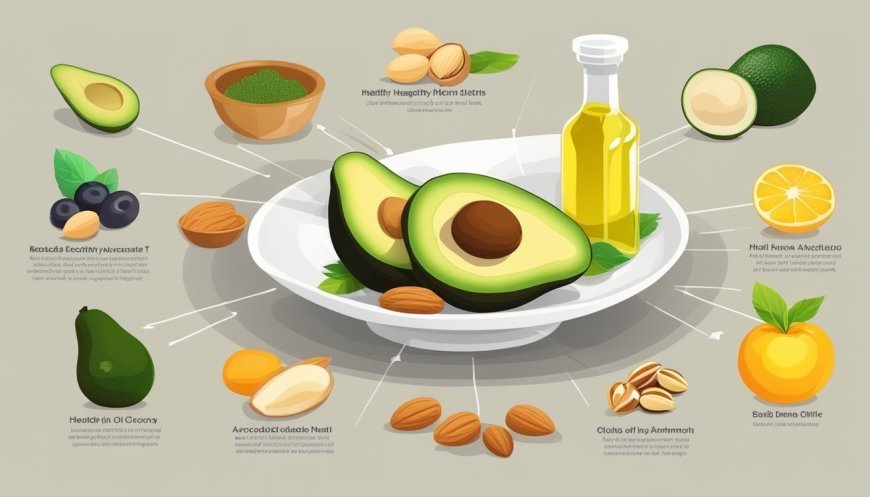Nutritional Tips for Boosting Your Immune System Naturally
An article related to Health and Nutrition.
10 Nutritional Tips for Boosting Your Immune System Naturally

In today's fast-paced world, maintaining a strong immune system is crucial for overall health and well-being. A robust immune system helps protect the body against various illnesses and infections. While many factors contribute to immune health, nutrition plays a vital role in supporting and enhancing the body's natural defenses. By making informed dietary choices, individuals can naturally boost their immune system and improve their overall health.
This article explores ten nutritional tips to boost immune system function naturally. From incorporating colorful fruits and vegetables rich in vitamins A, C, and E to adding immune-boosting proteins and healthy fats like omega-3s, these strategies offer practical ways to enhance immunity through diet. Additionally, the article delves into the benefits of spices, fermented foods, and their impact on gut health, providing readers with a comprehensive guide to strengthen their immune system through nutrition.
Incorporate Colorful Fruits and Vegetables

Consuming a variety of colorful fruits and vegetables is essential for boosting the immune system naturally. These foods are rich in vitamins, minerals, and antioxidants that play a crucial role in supporting immune function . The vibrant colors of fruits and vegetables come from carotenoids, which are powerful antioxidants . Aiming to eat at least five servings of fruits and vegetables daily can provide more than 200 mg of vitamin C .
Berries for Immune Support
Berries of all kinds are excellent sources of antioxidant vitamins A, C, and E . They also contain manganese and phenolic acids, which are beneficial antioxidant compounds. Incorporating berries into smoothies, salads, or oatmeal can be an easy way to boost immune health .
Citrus Fruits for Vitamin C
Citrus fruits are well-known for their high vitamin C content. Oranges, grapefruits, lemons, and limes are all excellent options . Vitamin C is crucial for immune function, and since the body doesn't produce or store it, daily intake is necessary . For optimal benefits, women should aim for 75 mg and men for 90 mg of vitamin C daily .
Leafy Greens for Antioxidants
Dark leafy greens such as spinach, kale, and arugula are rich in vitamins A, C, and various antioxidants . These vegetables also provide vitamin K, which, while not typically considered an antioxidant, has similar functions . To maximize nutrient absorption, it's best to consume leafy greens with a source of healthy fats .
Add Immune-Boosting Proteins

Incorporating proteins rich in essential nutrients can significantly enhance the immune system's function. These proteins provide vital components that support the body's defense mechanisms.
Fish Oil for Omega-3 Fatty Acids
Fish oil is an excellent source of omega-3 fatty acids, which are crucial for immune health. Cold-water fatty fish such as salmon, mackerel, tuna, herring, and sardines contain high amounts of long-chain omega-3s . These essential nutrients help all cells in the body function properly, particularly those in the eyes and brain . Omega-3s may also have cardiovascular benefits, potentially lowering the risk of heart disease and improving blood pressure .
For those who cannot consume fish due to allergies or dietary restrictions, plant-based sources of omega-3s in the form of ALA are available . Alternatively, fish oil supplements can provide about 1,000 mg of fish oil, typically containing 180 mg EPA and 120 mg DHA .
Poultry for Vitamin B-6 and Zinc
Poultry, such as chicken and turkey, is an excellent source of vitamin B-6 and zinc, both crucial for immune function. Vitamin B-6 helps reduce inflammation and is necessary for the creation of new red blood cells . Zinc, on the other hand, is essential for activating T cells, which control and regulate immune responses .
The recommended daily allowance (RDA) for zinc varies by age and gender. For adult women, it's 8 mg, while for men, it's 11 mg . Pregnant and breastfeeding individuals have slightly higher requirements. It's important to note that adults should not exceed 40 mg of zinc per day .
In addition to poultry, other good sources of zinc include beef, pork, chickpeas, cashews, oats, and tofu . These diverse options make it easier to incorporate this essential mineral into various diets.
Include Healthy Fats

Incorporating healthy fats into one's diet plays a crucial role in supporting immune function. These fats provide essential nutrients and have anti-inflammatory properties that can enhance the body's defense mechanisms.
Nuts and Seeds for Essential Nutrients
Nuts and seeds are excellent sources of protein, healthy fats, fiber, vitamins, and minerals . They contain high levels of monounsaturated and polyunsaturated fats, which are beneficial for heart health . Almonds, peanuts, and hazelnuts are rich in vitamin E, which helps increase T-cell count, directly killing infected host cells and regulating immune responses . Walnuts stand out for their high omega-3 fat content .
Seeds, such as sunflower, pumpkin, hemp, and sesame, contain zinc, a mineral that aids the immune system in fighting off invading bacteria and viruses . Sunflower seeds are particularly high in selenium and vitamin E, both of which support immune function .
Olive Oil for Anti-Inflammatory Properties
Extra virgin olive oil (EVOO) is renowned for its immune-boosting properties. It contains natural antioxidants that reinforce the body's defenses against viruses, infections, and bacteria . EVOO is rich in polyphenols, including oleocanthal and hydroxytyrosol, which protect blood lipids from oxidation .
The predominant fatty acid in olive oil is oleic acid, a monounsaturated fat that makes up 71% of the total oil content . Research suggests that oleic acid and other compounds in olive oil have anti-inflammatory effects . This anti-inflammatory action may be one of the main reasons for olive oil's health benefits .
Spice Up Your Diet

Incorporating spices into one's diet can significantly enhance immune function. Herbs and spices have been used for centuries in traditional medicine and are now recognized as potent dietary tools for boosting immunity . These flavorful additions offer anti-inflammatory and antioxidant properties that can strengthen the body's defenses against various ailments.
Garlic for Infection-Fighting Properties
Garlic has gained fame for its health benefits, particularly its ability to enhance immune cell activity. It contains compounds like allicin and diallyl sulfide that may inhibit the expression of inflammatory proteins . Studies suggest that garlic supplements can improve the immune system and reduce the severity of cold and flu symptoms in healthy individuals . One study found that large doses of garlic extract (approximately 2.56 grams per day) reduced the number of sick days with cold or flu by 61 percent .
Ginger and Turmeric for Immune Support
Ginger and turmeric are powerful spices known for their immune-boosting properties. Ginger has been shown to inhibit the production of inflammatory proteins and may help prevent respiratory virus infections . A study involving rheumatoid arthritis patients found that 1.5 grams of ginger powder daily for 12 weeks increased the expression of genes that prevent autoimmune reactions .
Turmeric, containing the active compound curcumin, offers potent anti-inflammatory and antioxidant effects. Research indicates that curcumin can modulate various immune cells and enhance antibody responses . For a simple immune-boosting remedy, Dr. Leslie Mendoza Temple suggests combining turmeric, black pepper, and ginger with raw local honey .
Don't Forget Fermented Foods

Fermented foods play a crucial role in supporting immune function and overall health. These nutrient-rich foods contain beneficial bacteria that enhance gut health and boost the body's natural defenses.
Yogurt for Probiotics
Yogurt is a probiotic powerhouse that offers numerous health benefits. It contains live cultures that regulate gut health and immunity by increasing the production of immune cells and strengthening the gut lining . Yogurt is also rich in essential nutrients like riboflavin, zinc, selenium, and magnesium, which support immune function . Studies have shown that yogurt consumers tend to have higher intakes of potassium, vitamins B12 and B2, calcium, magnesium, and zinc, as well as lower circulating lipids and glucose levels .
Kefir for Gut Health
Kefir, a fermented milk beverage, has gained popularity due to its potential health-promoting properties. It contains over 40 strains of live cultures, with billions in every serving . Kefir has been shown to have anti-inflammatory and antioxidant properties, contributing to improved immune and metabolic health . Studies have demonstrated that kefir can reduce proinflammatory cytokine production, decrease serum glucose levels, and increase serum IL-10 concentrations . Additionally, kefir may help mitigate allergic responses and has been found to decrease the number of parasites in feces while increasing intestinal sIgA concentrations .
Conclusion
Boosting your immune system through nutrition is a powerful way to enhance your body's natural defenses. By incorporating a variety of colorful fruits and vegetables, immune-boosting proteins, healthy fats, and fermented foods into your diet, you can give your immune system the support it needs to function optimally. These dietary choices not only have an impact on your immune health but also contribute to your overall well-being.
To wrap up, the tips outlined in this article provide a comprehensive approach to strengthen your immune system naturally. From adding spices like garlic and turmeric to your meals to including probiotic-rich foods in your diet, these strategies are easy to implement in your daily life. By making these nutritional changes, you're taking important steps to protect your health and build a stronger, more resilient immune system.
FAQs
What are the best foods to eat to enhance your immune system?
The top foods known for boosting the immune system include fatty fish, poultry, leafy greens, nuts, ginger, turmeric, and garlic. Incorporating these into your diet can help strengthen your immune defenses.
Can you list five specific foods that improve immune health?
Certainly! To help boost your immune system, consider adding these five types of foods to your diet: berries, fish oil, leafy greens, nuts and seeds, and a variety of spices. Also beneficial are citrus fruits, poultry, and brightly colored vegetables.
What are seven effective strategies to strengthen your immune system?
To enhance your immune function, follow these seven strategies: avoid smoking, eat a diet rich in fruits and vegetables, engage in regular physical activity, maintain a healthy weight, moderate your alcohol consumption, ensure you get enough sleep, and practice good hygiene to prevent infections.
What natural methods can be used to boost immunity?
Boosting your immune system naturally can be achieved through several practical steps: stay current with recommended vaccinations, eat a nutritious diet, exercise regularly, stay hydrated, get adequate sleep, and manage stress effectively.
What's Your Reaction?








